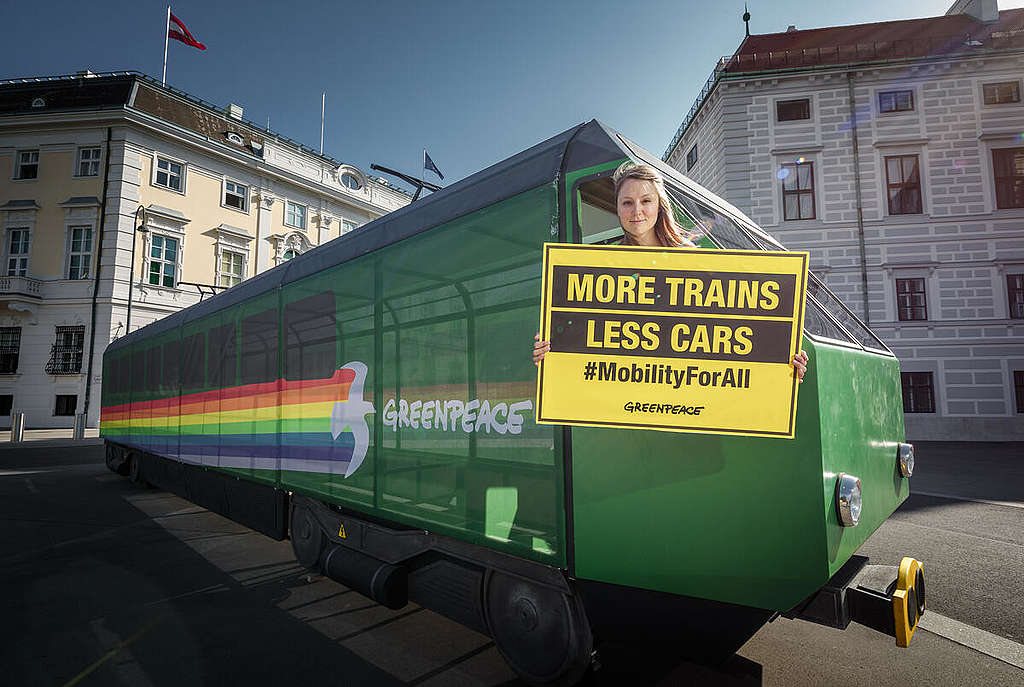This coming winter, Europe will face a major test, juggling an imminent threat of financial hardship and poverty for many households, due to skyrocketing energy prices, and the need to reduce greenhouse gas emissions as the climate crisis escalates and the war in Ukraine persists. While Europe is seeking to save energy, stop fueling war, meet its climate goals and address rising costs for households, EU policy-makers are ignoring the potential of the transport sector to address the multiple crises we face, writes Herwig Schuster, a transport expert for the European Mobility For All campaign with Greenpeace Central and Eastern Europe office, based in Austria.

The transport sector not only consumes more energy than any other sector in the EU, it’s also responsible for almost 30% of the EU’s greenhouse gas emissions, and is the second-largest expense for EU households, after housing. Transport also uses two-thirds of all the oil in the EU – much of which has been purchased also from Russia, contributing to funding Putin’s war in Ukraine and fuelling wars and conflicts worldwide.
There’s no doubt that our transport system based on fossil fuels is deeply entangled with the many crises we are facing. Oil demand for heating is also surging, and more industries are switching from gas to oil for production or power generation, which is expected to further drive up the price of oil products and worsen the energy and cost-of-living crisis. Northwest Europe’s stockpiles of road diesel, heating oil and other diesel-type fuel are set to shrivel to the lowest level in 10 years this November. Yet EU energy ministers meeting recently to address the crises, overlooked all transport measures that, if adopted, could significantly alleviate household bills and help counter looming fuel shortages in the EU in the coming winter.
New Greenpeace analysis: transport reforms can help save energy, money, and emissions
As the EU enters its annual European Mobility Week from 16-22 September, Greenpeace has published a new analysis showing how transport reforms and different mobility choices could reduce the energy demand of the transport sector by 13%, and save EU countries €36 billion on energy spending.
According to the analysis, the most effective measures to reduce energy consumption are affordable trains and public transport tickets across the EU, a reduction of flights with reasonable train alternatives and more efficient use of cars. People in the EU could save up to €63 billion on fuel if measures regarding car usage were introduced, such as an increase of home working, lower speed limits, and more efficient driving. But everybody, regardless of their mobility patterns, would benefit financially from the proposed transport reforms, whether through cheaper public transport tickets, lower expenses on fuel for cars, or through better access to free mobility infrastructure for cycling and walking.
The proposed transport-related energy saving measures would also lead to a reduction of greenhouse gas emissions by 180 million tonnes annually, equivalent to the emissions of 120 million fossil fuel-powered cars – almost half of the EU’s total car fleet (242 million passenger cars).
“Climate tickets” for public transport across Europe
It’s about time Europe started fighting the multiple crises we’re facing at the root: the transport sector’s addiction to oil is where many of the threads come together. First and foremost, we must drain the oil from our mobility system by reducing excessively polluting transport such as short-haul or private jet flights and shifting from fossil fuel-powered private transport to community-serving, sustainably powered trains, public and active transport like buses and biking.
The European transport sector could be virtually oil-free, and significantly cut its greenhouse gas emissions by 2040, if only policy makers stopped ignoring the transport sector’s potential to save energy, costs and emissions. Research commissioned by Greenpeace sets out a roadmap for EU decision makers on how to fully decarbonise the mobility system in less than 20 years, without having to rely on false solutions such as agrofuels, nuclear power and non-renewable hydrogen.
Across Europe, initiatives that made rail and public transport free or more affordable have proven to decrease car usage and greenhouse gas emissions, led to fewer traffic jams and a reduction in people’s energy and cost-of-living bills. Instead, fuel tax cuts and rebates across Europe have disproportionately benefited the wealthiest in society, who own the largest cars and drive more, exacerbating their negative impacts on the climate and rising social inequality.
We could fund community-serving, affordable and sustainable transport measures by slashing harmful subsidies for polluting transport and introducing taxes on the billions of Euros of dirty profits made by the fossil fuel industry over the past months, and ensure support for those households that are particularly vulnerable. Greenpeace calls on the European governments to introduce subsidised “climate tickets” for public transport throughout Europe, which will allow people to get around in a climate-friendly and affordable way. The European Commission has to provide guidance to member states to ensure equal standards and finance mechanisms across the bloc.
Affordable and well-developed public transport is key in achieving a fair transformation of our transport system. We all depend on mobility to meet our daily needs – from visiting family, going to work, university, school, on holiday, to the doctor or to do grocery shopping. It’s high time we laid down the tracks for a mobility system that is centred around our basic daily needs – and ensure we are able to live decent, happy lives on a healthy planet.
